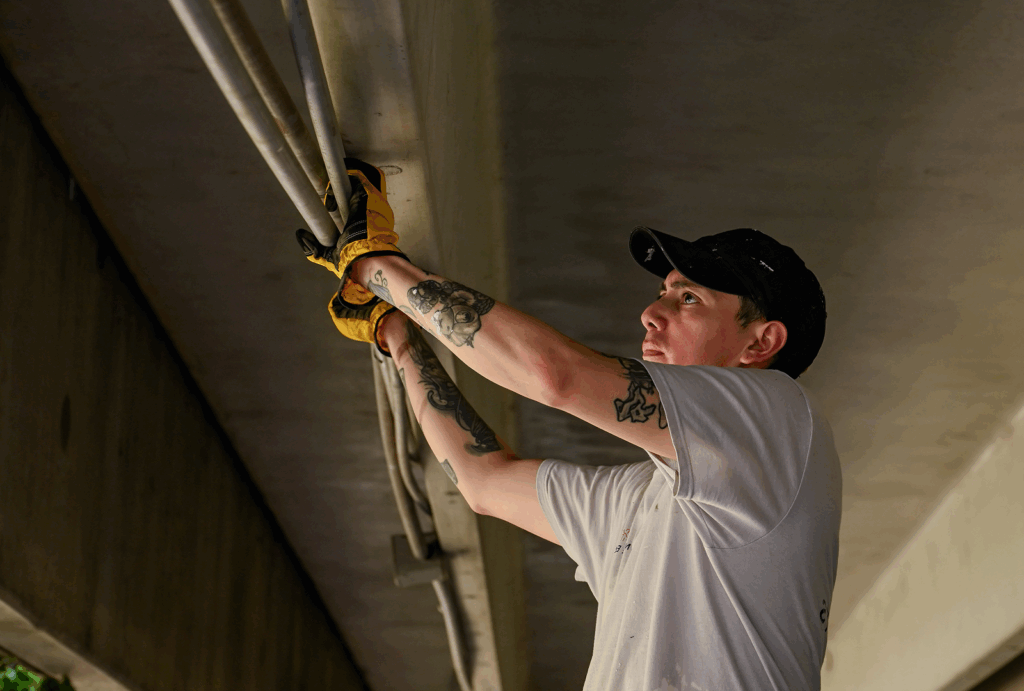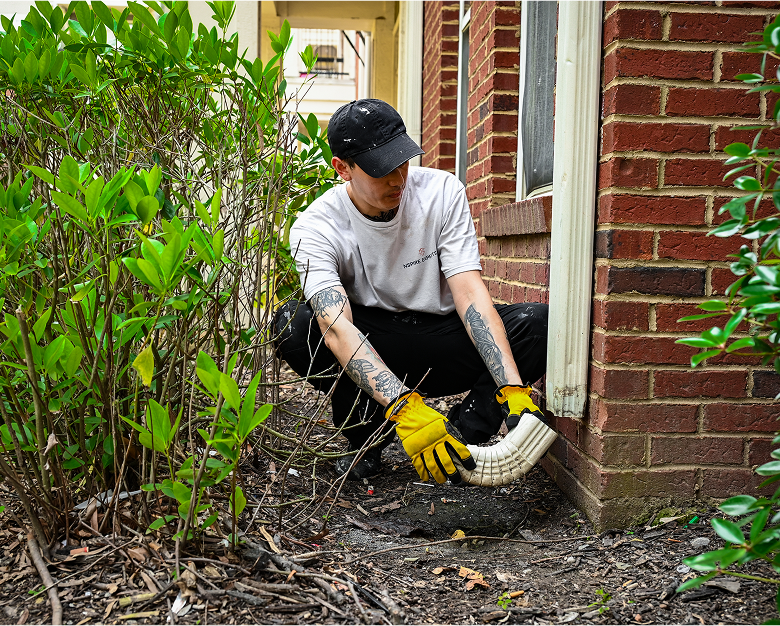For property managers and real estate investors operating in HUD-funded or affordable housing, passing REAC inspections isn’t just a routine task—it’s a critical checkpoint for compliance, funding eligibility, and tenant safety. Whether you manage one multifamily building or a nationwide portfolio, understanding the REAC inspection process at both the property and unit level is essential.
At NSPIRE Experts, we help you prepare, repair, and pass inspections with confidence—through expert pre-inspections, on-site repair teams, and day-of support. In this guide, we’ll walk you through what REAC inspections involve, what’s changing under NSPIRE, and how you can avoid costly penalties with the right preparation.

What is a REAC Inspection?
REAC stands for the Real Estate Assessment Center, a division of the U.S. Department of Housing and Urban Development (HUD). Its job is to assess the physical condition of HUD-assisted and insured housing through on-site inspections of both public and privately managed properties.
The goal? To ensure every federally subsidized property meets HUD’s standards for safety, sanitation, and functionality. REAC inspections play a vital role in supporting HUD’s mission to provide safe and decent public housing across the country.

What Do REAC Inspections Include?
REAC inspections cover both property-level and unit-level elements. The evaluation is comprehensive, with each deficiency tied to a weighted scoring system that directly affects your property’s overall REAC score.
Property-Level Inspection
Inspectors evaluate exterior and shared elements of the property, including:
- Site Conditions: Landscaping, sidewalks, fencing, drainage, and trip hazards
- Building Systems: HVAC, electrical, plumbing, and structural integrity
- Common Areas: Stairwells, hallways, laundry rooms, lighting, and emergency access
Unit-Level Inspection
Units are randomly selected and assessed for conditions such as:
- Health & Safety: Smoke alarms, water leaks, mold, pests, broken windows, and doors
- Functionality: Plumbing fixtures, electrical outlets, appliances
- Sanitation & Security: Cleanliness, ventilation, and proper locks
With NSPIRE standards beginning to influence REAC protocols, there is now an increased focus on life-safety issues and the resident’s experience inside the unit.

Understanding the REAC Scoring System
Each REAC inspection generates a numeric score between 0 and 100, based on the severity and frequency of deficiencies found across the property and sampled units.
Scoring Breakdown
- 90–100: Satisfactory — No action required
- 80–89: Minor issues — May prompt follow-up or documentation
- 60–79: Below average — Closer monitoring and shorter reinspection cycle
- 59 or Below: Failing score — Possible enforcement, funding risks, and mandatory corrective action
Consequences of a Low Score
Failing a REAC inspection has real consequences. Not only does it put your HUD funding and property reputation at risk, it can also:
- Trigger enforcement actions or corrective plans
- Delay refinancing or redevelopment efforts
- Lead to public designation as a “troubled property”
HUD’s Office of Inspector General has recently increased oversight of REAC to ensure inspection quality and accountability—making preparation more important than ever.

Transitioning from REAC to NSPIRE
HUD is actively transitioning from the traditional REAC system to a new, more modern inspection model known as NSPIRE (National Standards for the Physical Inspection of Real Estate).
Key Differences Between REAC and NSPIRE
- Scoring Criteria Shift: Less focus on aesthetics, more on health, safety, and functionality
- Increased Accountability: Day-of inspection findings may carry greater weight
- Resident Impact Emphasis: Inspectors will pay closer attention to the lived experience of tenants
What Property Managers Need to Do Now
As REAC evolves into NSPIRE, property owners must update their inspection preparation strategies. That includes scheduling pre-inspections, documenting repairs, and staying ahead of potential violations. Our NSPIRE Pre-Inspection Services are designed to help you identify and address problems before inspectors do—reducing risk and increasing your chances of passing on the first try.
Common Inspection Failures and How to Avoid Them
Even the most well-intentioned property managers can be caught off guard by REAC inspections. That’s because many of the most common failures stem from issues that are easy to overlook during day-to-day operations but critical under HUD scrutiny.
Frequent Issues Found in Properties
At the property level, REAC inspectors often identify problems such as:
- Trip hazards on walkways, including cracked or uneven pavement
- Exterior lighting outages, especially in common areas like parking lots or pathways
- Blocked emergency exits due to poor landscaping, storage, or weather damage
- Roof and gutter damage, which can lead to water intrusion and structural deterioration
These issues may not always be reported by tenants, but they directly impact your inspection score—and in some cases, tenant safety.
Why Unit Inspections Often Fail
Inside the units, the most common deficiencies tend to involve safety, sanitation, or maintenance neglect. Examples include:
- Non-functioning smoke alarms, often due to battery removal or lack of testing
- Signs of pests such as roaches, rodents, or bedbugs, which signal sanitation risks
- Water damage or mold, typically from plumbing leaks or roof issues left unresolved
- Inoperable windows or missing locks, which compromise both safety and security
What makes these failures more dangerous is that they’re scored more heavily under the NSPIRE standards, particularly if they affect tenant health or the livability of the unit.
How to Fix These Issues Before Inspection
The best strategy for avoiding REAC violations is proactive detection and resolution. While your internal maintenance team may be equipped to handle visible problems, only a trained professional can spot the subtle—and costly—deficiencies that HUD inspectors will flag.
NSPIRE Experts offers thorough pre-inspection services that assess your entire property using HUD’s own criteria. We’ll flag potential failures before HUD does, giving you time to act. You can also start with our free NSPIRE Inspection Checklist to perform your own walkthrough and prioritize key repairs.

REAC & NSPIRE Inspection Preparation Timeline
Preparation is not a one-day task. A successful inspection depends on a carefully structured timeline that begins weeks before the inspector arrives.
60–30 Days Before Inspection
This is the planning phase where most of the work gets done. Property managers should:
- Schedule a professional pre-inspection to identify deficiencies and set a repair plan
- Review prior inspection reports to address repeated issues or unresolved violations
- Coordinate with contractors or in-house crews for larger repair needs—especially HVAC, roofing, or structural fixes
- Audit all units and common areas to standardize conditions across the property
This window provides enough time for follow-up inspections or emergency fixes if needed.
14 Days Before Inspection
At this stage, you’re transitioning into fine-tuning mode:
- Conduct a final internal review with your maintenance team
- Fix cosmetic issues like paint, cleaning, or missing tiles that can impact scores
- Notify tenants of the inspection schedule and any prep they may need to participate in
- Confirm inspection logistics with HUD, including inspector details and unit sampling protocol
Day-of Prep
On the day of the inspection, details matter. Ensure that:
- All lights, locks, and life-safety systems work perfectly
- Walkways and entrances are clear of debris or obstruction
- All inspected units are unlocked and accessible
- Maintenance staff is available on-site for immediate issue resolution
- An NSPIRE Expert is present to shadow the inspector, providing real-time support and documentation (learn more about our Inspector Shadowing service)

Benefits of Professional Support for REAC Inspections
Partnering with a professional compliance firm isn’t just about convenience—it’s about safeguarding your investment, protecting your tenants, and ensuring peace of mind during one of the most critical milestones in property management.
Cost Savings from Preventing Reinspections
Failed inspections come with real financial consequences: loss of HUD funding, emergency repairs at premium rates, delayed developments, and even tenant displacement. By resolving issues ahead of time, you avoid costly reinspection cycles and reactive spending.
Time Efficiency Through Expert Coordination
Your on-site team already manages daily operations. Inspection prep is a full-time job in itself. With NSPIRE Experts, you gain access to a team that coordinates assessments, directs repairs, and ensures all HUD standards are met—so you don’t have to shift your team off critical tasks.
Peace of Mind from Knowing You’re Compliant
HUD regulations are constantly evolving. With the shift toward NSPIRE, even experienced teams can struggle to keep up with new expectations. Our consultants stay updated on every rule change, scoring model, and policy adjustment so you can pass confidently—without second guessing your strategy.

How NSPIRE Experts Supports Property Owners & Managers
NSPIRE Experts is more than a contractor or inspection firm—we’re a full-service partner built to help you succeed at every stage of your HUD compliance journey.
Expert Pre-Inspections with Action Plans
Our HUD-informed inspectors conduct detailed walkthroughs of every building, system, and unit in your portfolio. You’ll receive a comprehensive report outlining deficiencies, severity ratings, and a prioritized repair plan so you can act fast—and act smart.
Property Prep and On-the-Ground Repairs
We don’t just point out problems—we fix them. Our crews are trained in HUD compliance repairs and work efficiently to get properties inspection-ready. Whether it’s plumbing, electrical, or structural work, we’ve got it covered.
Inspector Shadowing and Day-of Advocacy
NSPIRE Experts accompany HUD inspectors during the assessment, asking clarifying questions, addressing inaccuracies, and making sure your property is scored fairly. Our Inspector Shadowing service has helped countless clients recover points and avoid penalties in real-time.
Speed and Scale – Nationwide, 48-Hour Service
We serve clients across the country and can begin work within 48 hours of your request. Need immediate help? You can get a free quote and book a property inspection fast—no red tape, no delays.
When Should You Schedule a REAC Pre-Inspection?
Timing is everything. We recommend scheduling a pre-inspection if:
- Your property hasn’t been inspected in over 12 months
- You recently completed renovations or major repairs
- You’re onboarding a new property or repositioning it under HUD
- You received a score under 80 on your last REAC inspection
- You have an upcoming NSPIRE pilot or full implementation date
Pre-inspections are not just for compliance—they’re a smart investment in risk management, reputation, and operational efficiency.
Frequently Asked Questions
Q: How often do REAC inspections occur?
Typically every 1–3 years depending on your last score. Lower-scoring properties receive more frequent inspections.
Q: What’s the difference between REAC and NSPIRE?
REAC focuses on physical condition scoring across multiple categories. NSPIRE is a new, more tenant-focused model that prioritizes health and safety and simplifies the scoring system.
Q: What score do I need to pass?
You need a score of 60 or higher to pass, though scores below 80 may still trigger additional HUD attention or shortened reinspection cycles.
Q: What happens if I fail an inspection?
Failing a REAC inspection can result in enforcement actions, funding loss, additional compliance reporting, and even tenant relocation if conditions are deemed unsafe.
Take Action: Pass Your Next REAC Inspection with Confidence
Don’t let small issues become big problems. Whether you’re navigating traditional REAC protocols or preparing for a full transition into NSPIRE, NSPIRE Experts gives you the tools, knowledge, and manpower to stay ahead of every inspection.
✅ Get a FREE Quote — Start your inspection prep today
📋 Download the NSPIRE Checklist — Use our proven framework to identify key deficiencies.
Fast. Reliable. Nationwide. Let NSPIRE Experts be your compliance partner.
